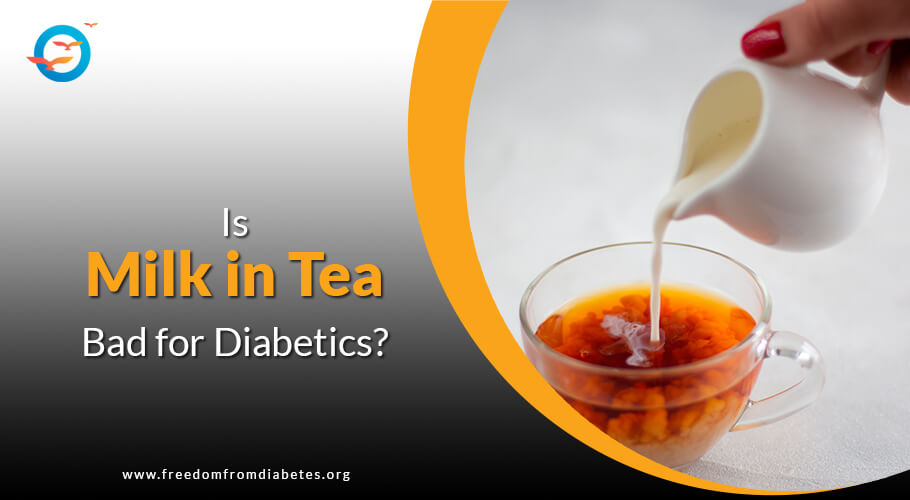Is Milk Tea Bad for Health?

Milk tea for type 2 diabetes
A fixed morning ritual for over a billion people, most of them in India—Tea has lots to commend it. But it’s the preparation that makes a difference. Read on to discover if your preferred morning cuppa is on the block.
Health drink
There are many studies that propound tea’s health-enhancing properties, including raising insulin insensitivity. However, that last benefit comes with a proviso: no milk!
But let’s start by looking at the benefits tea offers diabetics.
Anti-diabetic properties
Some types of teas, viz. black tea, green tea, and oolong have a high concentration of polyphenols, which are believed to enhance insulin activity. Polyphenols are also known to be anti-oxidative—a capacity to defend against inflammation, which is a key trigger for insulin resistance, and carcinogens.
In addition to polyphenols, teas like black, green, and oolong also contain flavonoids—these are micronutrients that are known to be anti-inflammatory, protecting the body from oxidative damage that leads to diseases like diabetes, heart disease, and cognitive problems like Alzheimer’s. The flavonoid in tea, theanine, has properties that help to control blood pressure and lower stress.
Health Benefits of Tea
Research over the years suggests that tea may have several important health enriching properties, in addition to improving insulin sensitivity, as follows:
-
Maintaining healthy blood pressure
-
Preventing blood clots
-
Reducing the risk of cardiovascular disease
-
Reducing risks of developing type 2 diabetes
-
Reducing risks of developing cancer
What happens when you add milk?
All of the tea’s many health-improving properties are negated when you add one simple ingredient: Milk!
There are three big risk factors that make milk a no-no for diabetics.
1: Carbohydrates (Lactose) Content
Milk has a high amount of carbs, about 12 to 15 grams per 250 ml bottle. Carbohydrates, as every diabetic is aware, are not good for diabetics as they cause an adverse spike in blood sugar levels. (BSL).
Worse, carbs in milk come in the form of lactose, which causes digestive problems, known as lactose intolerance, in almost 70% of the human population.
2: Fat
Milk is very high in fat, and processed dairy products like cheese have an even higher percentage of fat. Most of this is in the form of unsaturated fats, which are a cause of high blood cholesterol and heart disease.
Obesity is a growing problem across the world, especially when the fat collects around your middle. This visceral fat compromises the functioning of internal organs like the pancreas, affecting the production of insulin, which ultimately causes diabetes.
3: IGF
The third risk factor, and one of the most deadly, is a compound it contains, which is known as Insulin-like Growth Factor (IGF). IGF molecules get their name from their behavior, which mimics insulin, although it doesn’t do the job that insulin does.
In fact, IGF molecules prevent insulin from allowing glucose from the blood to enter cells, effectively causing glucose levels to rise in the blood. Stopping milk immediately has been proven to be very effective in lowering blood sugar levels. Which is why Freedom from Diabetes firmly advocates eliminating dairy milk and milk products from your diet.
The results speak for themselves. And you can experience it too. Just ban milk and milk products from your table for about four weeks. And you’ll be amazed at the change in your blood sugar levels. In addition to dropping your blood sugar, you’ll also lose weight, improve your digestion, and feel much more energetic.
Milk Substitutes
If you find it really tough to go without your milky tea, there are plant-based substitutes that you can try.
- Almond milk
- Rice milk
- Soy milk
- Coconut milk
Give it a go, you have nothing to lose but your insulin resistance.
Find out how herbal tea helps with diabetes. Read our article.
For more information about diabetes and tips to manage and reverse it, visit our blog page on www.freedomfromdiabetes.org or browse through the videos and articles on our Facebook/Instagram and YouTube channels
FAQs
Is milk tea good for diabetes?
No! Milk contains natural sugars (lactose), which can also impact blood sugar. Milk tea, especially if sweetened, can raise blood sugar levels due to its sugar content, which may not be ideal for individuals with diabetes .
Is milk tea high in sugar?
If milk tea is made with whole milk or sweetened condensed milk, it can be high in saturated fat and sugar, which may raise blood sugar levels.
What are the best milk substitutes for diabetics?
1. Almond milk
2. Rice milk
3. Soy milk
4. Coconut milk
Does milk tea cause weight gain?
Milk tea with added sugar or high-calorie sweeteners can contribute to weight gain if consumed regularly.
Does milk tea increase blood sugar levels?
Milk tea with added sugars can cause a spike in blood sugar, which may not be ideal for those managing diabetes or blood sugar levels.

